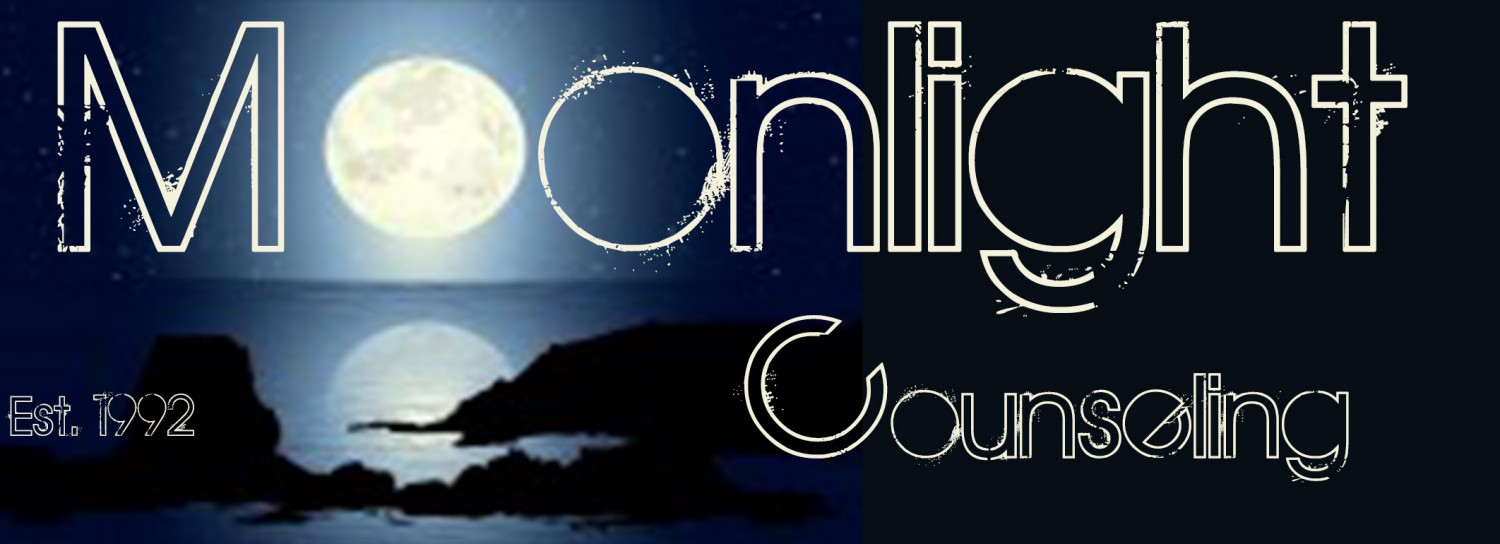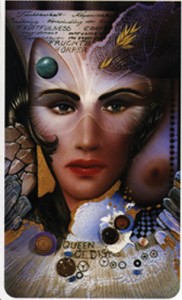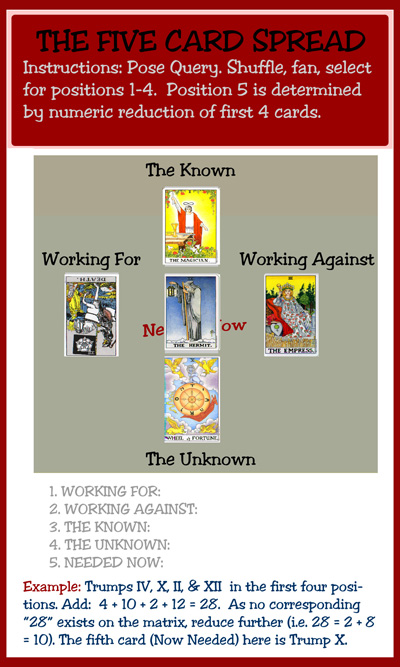HEALING CONTEXTS : PSYCHOLOGICAL TAROT VIGNETTES
What follows are vignettes of Tarot divination when utilized psychotherapeutically. They were selected from potentially hundreds of examples mostly because they continue to stick with me after so many years, and each I believe captures a distinct and familiar flavor of the process. But as we shall come to appreciate, every Tarot reading is an original event unto itself, non-replicable per se in its particulars, and can be judged as valid and meaningful ultimately only through the subjective experience of its recipient. In this way it is not different than a human relationship, a spiritual experience, a flavor of ice cream, or a work of art. [Excerpted from Tarot and Psychology: Spectrums of Possibility by Arthur Rosengarten]
A Woman’s Support Group
Several years ago I was invited to speak to an ongoing women’s support group about Tarot. I wanted to discuss the conditions under which experimenting with divination were most opportune and offered to make a small demonstration of the cards. The ladies seemed receptive to anything I might offer and gladly consented. The group was comprised of twelve to fifteen college educated, mostly middle-aged, affluent, professional women who had been meeting monthly for some three or four years. Meetings rotated between member’s homes and typically followed a potluck dinner. Few had experienced Tarot first hand, but everyone appeared quite curious.
What then took place was quite typical of the Tarot process, and I think instructive of its natural therapeutic agency when used in groups. Members sat in a circle around a coffee table and were given the preliminary task of formulating an agreed upon question, itself of course, three-quarters of the battle. Then they were encouraged to meditatively empty their minds of all expectation and distraction, shuffle or cut the cards mindfully as we passed the deck around the table, and with the help of several volunteers to randomly select four cards from the face-down, fanned deck, without turning them over. I placed these four unseen selections in their spread positions on the table. In the brief reading format utilized, only the 22 trumps were used, four were picked, and the fifth was determined by the numeric addition and then reduction of the first four cards, a common convention of this ancient artform. The fixed positions of the 5 Card Spread were: (1) What is Working For Us, (2) What Is Working Against Us, (3) What We Know, (4) What We Don’t Know, and the final position, (5) What We Need.
After a productive ten minutes of sorting through individual query ideas, it was not hard to determine the most compelling question of the bunch: What is the future direction of this group? I explained that after turning the first two cards in the spread (Working For Us /Working Against Us) I would begin by giving a brief explanation of each card’s established spectrums of meaning, including the dynamic tension existing between cards, and then ask the group members for their own personal associations to each card in the context of the question asked and the spread position in focus. What happened next was entirely unexpected by group members (though perhaps quite familiar to tarotists).
The very first card turned was Death reversed. To say the least, not the most tactful way to launch a reading, particularly as the invited guest. But what made the selection even stranger was the fact that it fell in the predesignated position: ‘Working For Us’. What, I wondered aloud, might this mean? I should emphasize that responding in this way is itself instructive of the proper approach to be taken towards a divination, directing one down quite a different road of inquiry than if one were to more authoritatively ask “is this true or false?” or exclaim “this means x.” The former attitude directs the endeavor towards introspection, a sense of mystery and possibility, the latter towards conscious evaluation, review, judgment and conclusion. Though sometimes helpful, the latter attitude narrows the spectrum of possibility.
 I then suggested to the rather baffled ladies that Death’s reversal paradoxically in this favorable position pointed to some significant inner change that was emerging in the group’s unfolding. Furthermore, I noted that the card was primarily concerned with endings and new beginnings, and its reversal suggested either some denial or resistance to such change, or else (vertically-speaking, as we shall learn later) the transformation was operating internally within individuals, and referred more to a subjective dimension, i.e. an “ego death” of sorts. The group mulled this over with little comment.
I then suggested to the rather baffled ladies that Death’s reversal paradoxically in this favorable position pointed to some significant inner change that was emerging in the group’s unfolding. Furthermore, I noted that the card was primarily concerned with endings and new beginnings, and its reversal suggested either some denial or resistance to such change, or else (vertically-speaking, as we shall learn later) the transformation was operating internally within individuals, and referred more to a subjective dimension, i.e. an “ego death” of sorts. The group mulled this over with little comment.
Moving next to the second position — ‘Working Against Us’–I turned The Empress card. Here I briefly described the “earth-motherly” attributes of The Empress–emotional support, fertility, unconditional love, passion, healing and so forth, and explained the positioning had curiously suggested such qualities were apparently not working so well for this group’s future direction. In fact, according to the reading, they were something of a disaster. What might this mean? Again I deferred back to group members. Up to that moment, I must say, the energy in the room had been genuinely quite friendly, supportive, accepting, and welcoming (that is, remarkably Empress-like) as one might expect from a group of warm and bright women who had been meeting together in this way for years. Now, after two measly Tarot cards, hot steam and fire began erupting like Mt. Saint Helens. Tarot, it seems, had presented an opportunity to air certain grievances, apparently quite atypical of this group’s normal functioning I was to learn later.
One woman flatly announced she was planning to leave the group but had been waiting for months to find the appropriate opening to announce her intention. People were shocked to hear it. She was obviously responding to the cards, but made no mention of them. Another woman said she resented the tendency of “certain members” to tacitly promote “only safe and nice interactions” while often leaving her feeling like an ogre in her less composed side. She, though, declared outright– “I sometimes feel smothered by The Empress. Frankly she makes me sick!” as her finger aggressively poked at Trump 3 on the table.
The hostess was visibly bothered by the comment and countered defensively, “I think that’s your choice Mary, the space is there and has always been there.” A brief debate ensued. Another woman broke out with the admission of having just been diagnosed with breast cancer, claiming apologetically “I wasn’t planning on saying anything” for fear that such news would cast a pall over the evening. A sad indictment, I thought, for a support group that didn’t seem safe enough for such important news. “But that’s why we’re here” another woman was quick to respond, “I can’t believe you would feel that way.” I felt like I’d stumbled into the murky undercurrents of a major family conflict (which clearly and unapologetically I helped to precipitate). I knew, therefore, we were hitting important ground, a therapeutic “bulls-eye” so to speak. Instinctively, from years of practice, I simply stayed out of the way for at least the next twenty minutes of lively disclosure that heated the ambient livingroom.
Two opposing camps were coming to the fore, while a third group of “undecideds” looked on, anxious and a little amused. One camp was expressing a long held (and previously unshared) dissatisfaction with the group’s tacit agenda of positive support at the expense of direct confrontation and difference of opinion. They complained that the group held no place for dissension within ranks. This was the ‘Death reversed’ camp, as I could now formulate it rather succinctly through the card. The other camp, the ‘Empress’ camp, much to the contrary, upheld and defended the group’s status quo, referring regularly to the affirming virtues of the great goddess who rested there on the table. “We’ve all got enough negativity in our lives” echoed one distinguished Empress-camp spokesperson, “this is a place where we open our hearts and grow together.” “That’s why I come” reiterated another, even as the troublesome positioning of the cards themselves suggested quite a different destiny for the group’s unfolding. The problem was becoming more clearly defined.
I then advised that we move on to the next two cards representing ‘What We Know’ and ‘What We Don’t Know’ regarding the stated question pertaining to the group’s future direction. In position three (‘What We Know’) I flipped over trump 1, The Magician card. In unison, everyone sighed. Ahhhhhhh! You might have thought it was Santa Claus, or perhaps in a slightly different circle of women, a surprise visit from the likes of Wayne Newton or Alan Alda. Group members seemed greatly relieved to behold this magical fellow, especially given the tensions that had just flared in the room. By contrast, The Magician appeared cuddly and comforting in this context; He was easily associated with the group’s own established charter vis-à-vis personal growth, transformation, and personal empowerment. My brief interpretation brought little response, as the card’s relevance seemed transparent and required no further explanation.
This often is the case with certain cards in a full reading and reflects Tarot’s confirming and diaphanizing (clarifying) properties of what is consciously known. When a card is greeted by a quiet nod and requires little further explanation it is not unlike some high and holy sage taking you aside, placing his compassionate hand upon your shoulder and whispering gently into your ear: “You know how you’ve always felt about x? Well you were quite correct to feel that way. Nice work, keep it up!” When a card diaphanizes what we suspect to be so, our mild suspicion is raised to formal acknowledgment and a new measure of confidence in the matter is consciously achieved. Here the timely appearance of The Magus seemed a fitting reminder of the known reasons for why we were here. To gain a higher vision of the group’s future direction.
The next card however was a little less mellow. In the fourth position (‘What We Don’t Know’) came trump 10, The Wheel Of Fortune, but reversed. As it was positioned to point to the unknown, I interpreted the card as suggesting some group difficulty around issues pertaining to change, cycles, rhythm, and timing. “The laws of change are impeded in their natural flow,” I said, “and there seems to be confusion over the matter of right timing pertaining to this cycle of the group’s evolution.” Furthermore, I asserted, the positioning encouraged greater attention be paid to this unseen and hindered dynamic.
Then once again I deferred to group members for their personal associations, and almost on cue, once again the two opposing camps instantly reignited. The woman with breast cancer complained that the group was rigid and not responsive to her real needs. She wanted change but didn’t know how to ask for it. Her anger was now on the surface. “I need to be with real people who can talk about real things like suffering and pain without trying to fix it!” she bitterly complained. She preferred less magic, she said, and more hard core reality in her life. Another woman objected, saying she was hoping for quite the opposite– “less of the crap that drags us down in our lives and frankly a little more magic and wonderment would be lovely!” Still another woman shared feeling oddly “out of synch” with the last several meetings and didn’t know why. Something no longer felt right to her. Others shared similar impressions. One woman commented, “maybe this is just part of the cycle of any group’s evolution?” Indeed. I said nothing. The cards were so much more eloquent.
I sat quietly as the process unfolded away from the reading in progress. This is usually a good sign that the divination is taking hold. Someone even apologized to me for getting off the topic of Tarot, to which I simply laughed and said “this is often the way it goes.” Group therapists are well familiar with the pure process quality of these spontaneous, flowing interactions, and in fact, covet them. Now the issue of decision-making and agenda-setting was hotly debated, polarized, of course, between the Death reversed camp and The Empress camp. Several members in fact applauded the level of intensity and open expression, observing that this was all fresh and new for the group. Others said they were not comfortable with the chaos and emotionalism. I was asked to comment on what I saw in the reading thus far, and briefly acknowledged what seemed to be an unspoken tension among members needing more group cohesion versus more room for individual expression. I said that change and difference seemed uncomfortable issues to discuss in this group, but were important issues nonetheless.
I then suggested we move to the final card in the fifth position, determined by a numerological reduction of the first four cards. Thus I added Death (13) plus The Empress (3) plus The Magician (1) plus The Wheel Of Fortune (10) to determine the fifth position, ‘What Is Needed’. The answer (as often occurs) was both startling and confirming, in this case being none other than trump 9, the lantern bearing and austere monk himself, The Hermit. “What might this mean?” had by now become the mode of response reflexively asked by every group member, oracular music to my ears. What was needed for the group’s future direction, I said, was greater individuality, spiritual focus, self-reflection and introspection. And absolutely more permission for individuality and difference, with less concern for approval or agreement. At least, this is what the Hermit himself would tell you.
Trump 9, I explained, was foremost an agent of individuation, and therefore he must follow tenaciously his own inner direction regardless of external pressures. Of course, I was simply interpreting the card the way I always interpret it, within the context of the query, the spread position itself, and the querent(s)’ personality. I was sure The Wise Old Man’s strong showing in the final position had made The Empress camp quite uncomfortable to say the least. Fortunately for me, a willing victim through the years of many misplaced therapeutic outbursts (an important part of the job), these reactive transferences would now be directed at the message itself, and not the messenger. Therapeutically, a great opportunity is thus presented for working through the transferential content. In many ways the confrontations stimulated by a nonpersonal authority figure such as Tarot becomes less easily projected onto the therapist, thereby fostering a cleaner encounter with a client’s wounded past while freeing up the therapist to occupy a gentler and perhaps more helpful proximity to the pain. One is left to consider the so-called “luck of the draw” in both a literal and symbolic sense.
Not for this reason alone have I long ago learned never to hedge an interpretation. The ‘luck of the draw’ is a naked truth of life itself. It’s how we choose to assemble ourselves around the luck of the draw that counts. As a Tarot reader I implicitly trust that each selected card is always accurate (or relevant), however baffling or unpleasant it may seem at first, particularly when it is honored with the open and at once humbling attitude that inquires: “what might this mean?” What lessons and possibilities might be here for me to explore? What of myself is mirrored in this card? It is properly left to us, as readers and questioners, to discover exactly where and how such meaning is best served.
Our group, however, had appreciably quieted down at this point, becoming (how else to put it?) notably contained and subdued, reflective but intense, inner-directed and clearly introspective, that is to say, distinctly Hermit-like. I could feel both camps seriously digesting His implications for themselves personally and for the group’s future as a whole. In fact, there was little left to say. The Hermit now carried the moment, the seeds were planted, and He was perhaps his own best spokesman. The prognostication was now over, and rather quickly the group began to disband. The ladies politely made their way over to my seat, thanking me for a fascinating evening, before making their private and unceremonious exits. I don’t know how the group was to continue after that evening, but I am confident that the Tarot had done its job.







